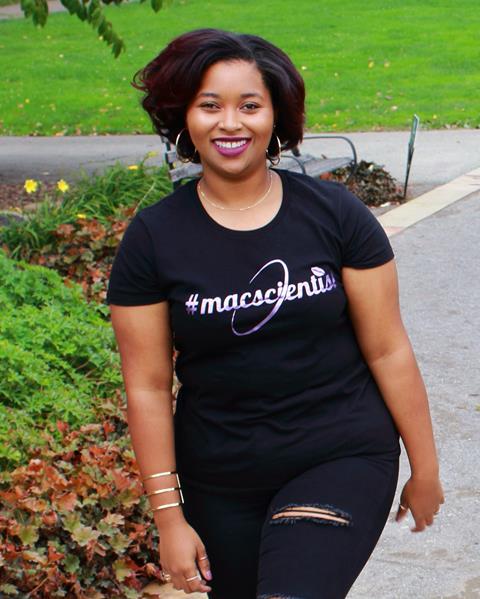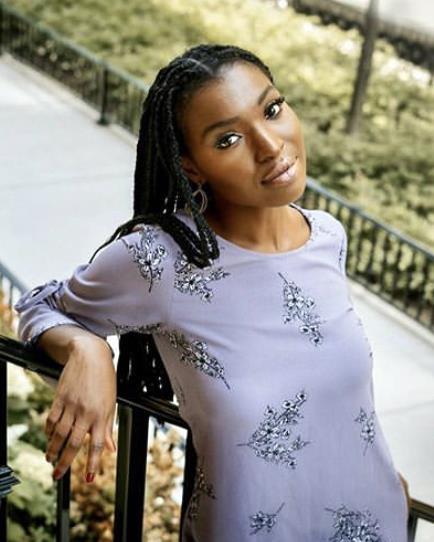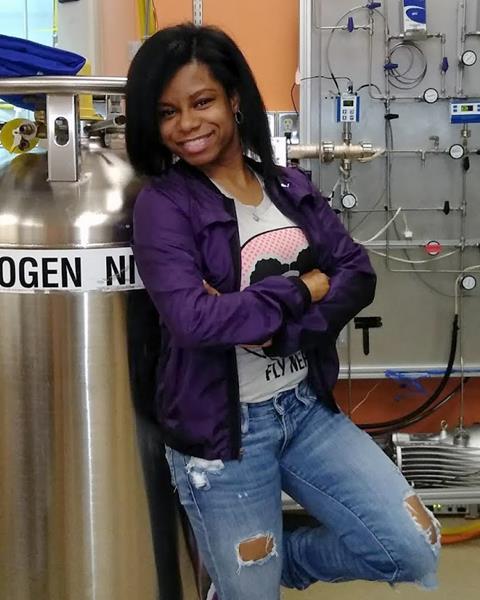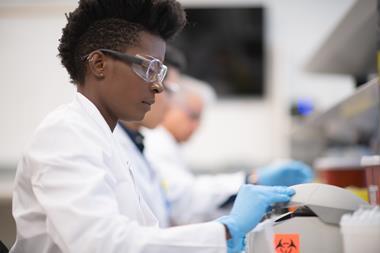The US organisers of #BlackinChem week share their stories
Devin Swiner
Like any chemist in their final year of graduate school, I have many things on my mind. I am constantly thinking about finishing my research projects, writing my dissertation, applying for jobs, training other students in my lab. But as a Black chemist, there is something else that weighs on my mind: the kind of legacy I am leaving behind.

When I started my undergraduate degree at the University of Pittsburgh, I was one of just three Black chemistry majors. And there was only one Black, tenure-track faculty member in my department, who was also a woman. Sadly, this is the case for a lot of Black chemistry students. Black students are already an under-represented minority at some of these universities, and our numbers in chemistry are even smaller, making it hard to foster a sense of community with people that look like us. I love and cherish the non-Black chemistry friends I made at Pitt, but I longed to have more Black chemist friends to share my experiences with.
I wish I could say things were different when I started my PhD at Ohio State University, but when I arrived in Columbus in the fall of 2016 I found that I was the only Black person in my cohort. However, I was at least better prepared to act, and so STEM advocacy became an integral part of my PhD journey.
Not just a student
Being Black in chemistry means you do not have the luxury of just being a student; the workload goes way beyond your organic and physical chemistry classes. As an undergraduate, I had to foster a community outside of the one I was the most comfortable with, find allies that would defend me when I was not in the room, and advocate for myself when there were no allies to be found. That is a lot for an undergraduate, and it’s even harder to manage when you do not have anyone to show you the ropes.
So, it was important to me to bridge that gap for others. Now, I mentor students, I serve as chapter president of Ohio State’s chapter of the National Organization of the Professional Advancement of Black Chemists and Chemical Engineers (NOBCChE), and I advocate for Black and non-Black chemistry students of colour as boldly as I can. I am always talking to somebody about how to improve the lives of Black chemistry students. From recruitment practices to creating thoughtful programming through our NOBCChE chapter to keeping an ‘open door policy’ for students in my research group’s office, I want to support the graduate and undergraduate students I come across.
Not just a chemist
I have had great mentors and a vision for my career, but that is not always the case for Black students. We still need guidance, a safe space to talk candidly about our experiences, a place where we can feel supported. In 2017, a few Black women in STEM friends and I started a blog, called #MacScientist, to do just that. We use it as a space to talk about our journeys, offer mentorship and foster community with other Black women in STEM fields. And this work will not stop when I graduate in May and get my first ‘big girl job’ – my goal in my career is to pour out to others as others have poured into me, and to create the spaces that I did not have. Because being Black in chemistry means you do not have the luxury of just being a chemist.
#BlackInChem week is a way to continue my advocacy and to leave a mark in my field. I am thankful for everyone being receptive to the week’s content and for wanting to learn more about the work and experiences of Black chemists. I cannot put into words how happy I have been talking to people from different backgrounds and seeing that there are people outside of the organisers that are excited as well.
I want to be a voice for those that may not know how to navigate white spaces and to uplift and celebrate Black students. I want to be part of the new generation of chemists that does not forget about the ones coming after her. I want to cultivate a strong sense of community based on support and celebration. I want to amplify Black chemists everywhere, always, so that Black chemistry students can one day have the luxury of just being students.
Ayanna Jones
As a Black undergraduate chemistry student at Clark Atlanta University, I felt protected. Clark Atlanta is a Historically Black College and University (HBCU); I was surrounded by Black students on campus and taught by Black faculty. I was also connected to the largest consortium of HBCUs in the world. More importantly, as a Black chemist I had the pleasure of knowing and meeting people who were not just chemists, but who identified themselves as Black chemists. I was protected, accounted for and nurtured unequivocally. And then I graduated.

Imposter syndrome
I moved to Emory University to pursue my dream of a PhD in chemistry. But my dream came with a hard dose of reality. I was once again in an environment where I was in fact the only one in my classrooms that identified as Black. Being in graduate school is tough, and when there are added identities to navigate it’s even tougher – being both Black and a woman has given my own journey particular challenges. It’s daunting when you are the only one in the room, and it adds an extra level of anxiety and imposter syndrome to an already challenging situation. Black students, and specifically Black STEM students, face unique challenges that students of other racial backgrounds may not encounter. For this reason, forming a community is often the best option for Black students in environments where they could easily be isolated.
And that is why #BlackInChem exists. It is a way for Black chemists at all stages of their careers to network and to encourage one another along a journey that no one should have to undergo alone. I am blessed to play part in its creation. As a current graduate student, I can still recall my time as an undergraduate who wished to pursue a PhD in chemistry, and I also look forward to life after graduate school. So I have the privilege of being both a facilitator for #BlackInChem, and also a participant, as the advice and networks shared during the week will benefit to me as well. I am also excited to introduce a new and oftentimes overlooked framework into how we look at equity and science. In fact, equity and science go hand in hand – we can and should discuss science and equity and inclusivity in science at the same time. #BlackInChem will build on that principle.
Sharing and celebrating
Most of all #BlackInChem week is about sharing the amazing things that Black chemists are doing, and celebrating their accomplishments. And while there are many things that I love about #BlackInChem, it is the fact that Black chemists are uplifting and promoting other Black chemists that I cherish most. It’s inspiring to know that so many people around the world will get to hear these stories, and will learn about the incredible Black chemists who often go unrecognised and who are not discussed.
As organisers of #BlackInChem we also look at the examples set by the many organisers of various weeks before us and we are thankful to them. The support and encouragement of the creators and participants of #BlackBirdersWeek, #BlackInAstro and #BlackInNeuro to name a few shows that Black scientists, despite belonging to varying and sometimes distant subfields, relate on the common and inseparable identity of being Black and/or identifying within the African diaspora. I want the world to see that Black chemists exist, that Black chemists matter, and that Black chemists hold the keys to the future.
Ashley Walker
As a non-traditional student from the southside of Chicago, US, I’ve always thought my chemistry career would’ve been a smooth transition. I started off my chemistry career at a junior college and later transferred to Chicago State University. That transition to Chicago State brought with it many different experiences and achievements, but also many obstacles to face; everything from celebration to discrimination. I’ve had research experiences at Harvard University and Johns Hopkins University, I have been an advocate for students and I have been a science communicator. But there were also many times where I would also have imposter syndrome or feel I didn’t belong. Nonetheless, I kept pursuing my dreams and I found the support that was needed to keep me motivated. And all the time, I was learning how to balance two worlds which would help me in the future.

After I graduated recently, I began interning at Nasa Goddard Space Flight Center. Being at Nasa has helped me understand the importance of planning my future. It also solidified and validated me as a Black chemist.
Finding a community
I’m currently in the process of applying for graduate school. There are so many different things that I have to think about: location, housing, insurance, and much more. We often hear faculty members encourage their students for fellowship opportunities, however, I’m currently in a position where I’m thinking about what research I want to pursue in the future.
This is a commitment for 5-6 years and I also have to choose my advisor wisely. This next transition is one I am not used to. I’m comfortable with being busy and balancing my time as an undergraduate. However, I’m now entering a space where I’ll also have to find a community.
Black chemists like me dream of seeing more of us doing chemistry in astronomy. There’s so few of us in the field. I look at my past experiences and use that as a way to continue to push forward. I hope more Black chemists like me and those who are also traditional find the support that will allow them to apply to graduate school. And I hope that #BlackinChem week will help Black chemists feel like they do belong and help them find a community. The transitions ahead will not be easy either, but I’m confident that I’ll make it through.
#BlackinChem week runs 10–15 August 2020 on Twitter
Y’all ready for the flyer for #BlackinChem ?! 👀👀👀👀👀@That_Astro_Chic @onlyayanna_ @KathinatedDrink @blackinthelab @NatRodLopes1 @hi_d_nq and I are sooooooo excited 🎉🎉🎉
— Devin, The Chemist 👩🏽🔬💙 (@Devin_Eleven) July 24, 2020
Mark your calendars! pic.twitter.com/Lj4RT6XKp8












No comments yet